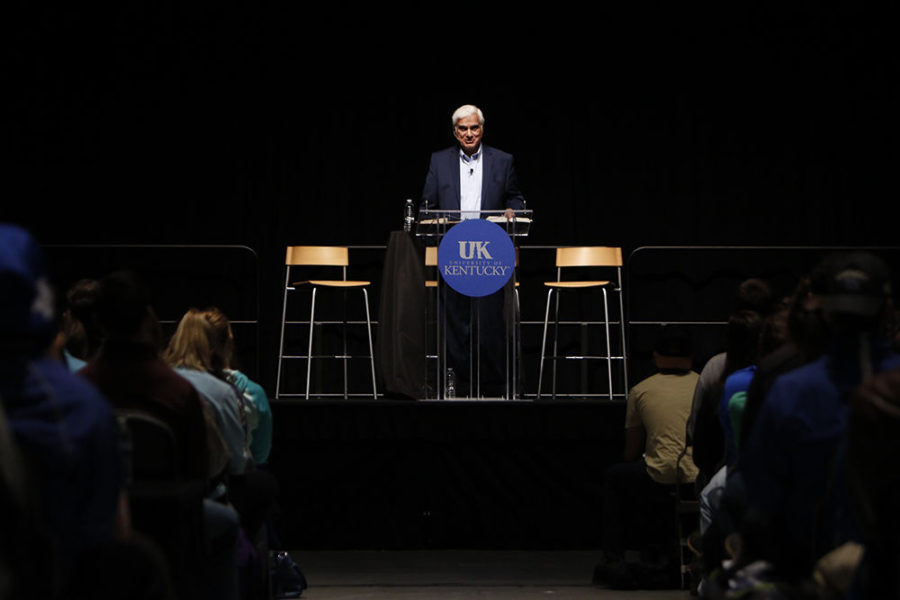Q&A with Ravi Zacharias
February 26, 2016
The Kentucky Kernel spoke with Christian apologist Ravi Zacharias, who recently spoke at UK.
Your ministries have spanned continents and you have contributed to the geopolitical discussion among politicians and the populists alike. Do you feel your message can contribute to the growing crisis of racial killing in America and the barring of refugees throughout the world?
Ravi Zacharias: This is a huge tragedy in our time. We must all do our part to find answers. There is no single answer but we must provide a forum for a civil and helpful discussion on the subject. There are deep hurts here and great suspicion. Politicians, law enforcement, parents, religious leaders and people who feel victimized must come together. It will not be solved without communication. The anger is real and so should the solutions be real.
As I travel I try to address these in private meetings. One of the most important things is to build strong families for both the oppressor and the oppressed. That’s where genuine values must be taught, for all humanity. Without building the family unit, fragmentation, isolation, alienation and discrimination begin.
You mentioned last night that two of the greatest struggles facing young people is addiction to pornography and suicide, and that you hope to give answers to young people struggling to find their way. What kind of encouragement or guidance can you give to our students struggling with depression, anxiety and countless other difficulties that contribute to these unfortunate conclusions?
RZ: This is a tough question and it is very important to know where lines are crossed from existential despair to genuine psychological issues or other traumas that can have a bearing. Individuals should have access to the best of counselors who can detect what the real issues are.
For many the addiction to pornography and sensual appetites are often about a search for fulfillment, but they are looking in the wrong places. For those individuals, the challenge of spiritual truths is extremely important. Where other predisposing conditions attend, professional help is critical.
The speech in Memorial Coliseum was emotionally evocative in the spiritual sense for many listeners, but I noticed your speech seemed more limited in its use of actual scripture (except in the Q and A) than famous world leaders and philosophers (Gandhi, Nietzsche, King and Muggeridge). Is it purposeful that you mention historical examples that maybe the audience is more familiar with?
RZ: Yes, indeed. The audience determines the starting point. I struggle with this off and on. To quote the scriptures to the skeptic is to only make the listener question your authority. To bring them to the scriptures from common ground and historical allusions is to lead to the truth and not to begin from a perspective they question.
In the Q and A you answered a question I think many evangelists and Christians across the board fumble over: how can feminists be Christians when the bible makes so many statements about their inferiority to men? While I appreciated your complete answer, I am curious, has there been a subject you’ve come to in study that you have yet to find an answer for?
RZ: There are challenging questions every worldview faces. I can honestly say that for the follower of Jesus, the questions become more peripheral. For the one living a naturalist’s worldview, I see the questions as systemic and not merely peripheral.
In your speech you mentioned the man asking Jesus should have had a follow-up question and then gave what you thought Jesus’ response would be. If God was real, what question would you ask of him?
RZ: I know God is real. I am more concerned about the questions He has for me than what I have for Him.
What is the most difficult part of leading your ministry?
RZ: Finding gifted people who are humble. I also struggle with so much commercialism of the gospel in our time that one has to find a well-balanced way of building a ministry and not selling it. You don’t want to add to the skepticism of the skeptic. You have to win their respect and trust first.
Can you share any quirky or heartfelt memories you have of speaking with college students?
RZ: I am truly honored that they give us a hearing. It is an immense privilege to be in front of student audiences. Navigating the cultural landscape is a difficult calling. I find students are often sold a false narrative by skeptical instructors as if the Christian message lacks intellectual sophistication in contrast to the naturalist’s worldview.
That often prompts stereotypical questions and distorted assumptions that have to be corrected first; for example, statements such as “all the killing that goes on in the name of religion.” That is a dangerous half-truth. Nothing in the previous twenty centuries compares to the slaughter “irreligion” has done. We must understand what is real before we raise meaningful questions. Answers are important and must be sought. But thinking through the questions is an important prerequisite.
It is truly an honor to have been a guest at the recent event on the campus. I look forward to the day I can return.
































































































































































